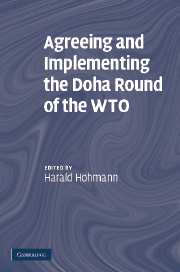Book contents
- Frontmatter
- Contents
- List of Contributors
- Foreword
- Introduction
- The future of the Doha Round
- PART ONE Development policy of the WTO
- PART TWO Trade policy (including competition) and trade facilitation
- 6a Trade policy objectives in the Doha Round – A European Union perspective
- 6b The final phase of the Doha Round
- 7 Further liberalisation of trade in chemicals – can the DDA deliver? A summary of the chemical industry's position on the Doha Development Agenda
- 8 Trade facilitation within the Doha Round: A critical review of recent efforts of the WTO and other international organizations (1996–2006)
- 9 ICN accompanied convergence, instead of WTO imposed harmonization, of competition laws
- 10 Legal principle of integration in the Doha Round: Embedding a social order in the global market
- PART THREE Reform of the dispute settlement system
- PART FOUR Social rights, health, and environment
- PART FIVE Conclusions
- Index
6b - The final phase of the Doha Round
from PART TWO - Trade policy (including competition) and trade facilitation
Published online by Cambridge University Press: 23 February 2010
- Frontmatter
- Contents
- List of Contributors
- Foreword
- Introduction
- The future of the Doha Round
- PART ONE Development policy of the WTO
- PART TWO Trade policy (including competition) and trade facilitation
- 6a Trade policy objectives in the Doha Round – A European Union perspective
- 6b The final phase of the Doha Round
- 7 Further liberalisation of trade in chemicals – can the DDA deliver? A summary of the chemical industry's position on the Doha Development Agenda
- 8 Trade facilitation within the Doha Round: A critical review of recent efforts of the WTO and other international organizations (1996–2006)
- 9 ICN accompanied convergence, instead of WTO imposed harmonization, of competition laws
- 10 Legal principle of integration in the Doha Round: Embedding a social order in the global market
- PART THREE Reform of the dispute settlement system
- PART FOUR Social rights, health, and environment
- PART FIVE Conclusions
- Index
Summary
Although the history of the Doha round of global trade talks has repeatedly demonstrated the stakeholders' inability to meet self-imposed deadlines, there is still hope that the talks can be completed by the end of 2008. A host of economic and political factors indicates that this hope is well founded. No single country has the power to derail the talks and with them the existing multilateral system. On the contrary: most members of the World Trade Organization want to see the talks succeed, a sentiment that has been echoed by numerous heads of major trading countries, including US President Bush, British Prime Minister Brown, German Chancellor Merkel, and Brazilian President Lula da Silva.
The Doha talks are currently moving through their final phase like an undulating procession. It will in the end be not a “marche funèbre” but rather become a low-key victory parade. The outcome of the Doha talks will undoubtedly leave all stakeholders dissatisfied to one degree or another, since it is unreasonable to expect the results of a complex multilateral process requiring the consensus of 150 member nations and customs territories to fit the bill for all concerned. At the same time, the large number of players involved and the widely divergent interests they bring to the negotiating table clearly illustrate why closure for the Doha process has been so long in coming.
Not only political considerations, but all of the prevailing economic reasons speak for a successful conclusion to the Doha process. The integration of developing countries into the global trading system remains a top economic and political priority, since this is the most effective known weapon against poverty, terrorism and regional conflicts.
- Type
- Chapter
- Information
- Agreeing and Implementing the Doha Round of the WTO , pp. 151 - 159Publisher: Cambridge University PressPrint publication year: 2008



